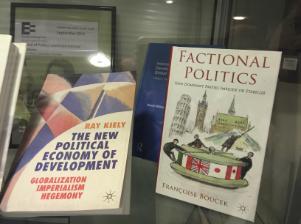International Relations and Politics on the IFP
You complete two 15-credit modules if you choose this subject: Introduction to Politics in the first semester and Introduction to International Relations in the second semester.
The two modules provide an introduction to concepts of politics and political processes both nationally and internationally. They are a foundation for a more advanced study of international relations or politics.
This module also seeks to develop your general world knowledge, research skills and ability to both listen and communicate effectively within an academic context.
Why do this subject?
There are two reasons to study international relations and politics. First, it is useful and develops practical skills such as the ability to read academic texts, to write academic essays and exams, and to present convincing arguments. Consequently, it is well-regarded by both universities and employers. It also gives a good insight into what learning at university is like as it is taught at undergraduate level. Secondly, students take this module because they have an interest in politics itself and how our world is shaped by political forces. Indeed, this subject is essential to understanding our world.
What do you study?
Introduction to Politics explores important ideas about politics and political processes, such as citizenship, pluralism, elitism and class. It also introduces students to debates about some of the essential terms used to understand politics such as ‘politics’ itself and power.
Introduction to International Relations looks at how we understand political processes on a global scale with a focus on the major theoretical approaches to international relations: liberalism; realism and Marxism.
How are you taught?
You are taught through a weekly lectures and seminars. The lectures offer a general guide to the ideas in the readings and the seminars are an opportunity to explore the issues raised in the lecture and readings in greater depth. You are encouraged to contribute to seminars through pair work, group work and whole class discussion.
How are you assessed?
You are assessed through a combination of portfolio work, class tests and coursework and, for International Relations, a final exam.
Who teaches this subject?
The module teaching is led by Dr Nick Hostettler, a Senior Lecturer in the School of Politics and International Relations at Queen Mary. Nick completed his doctorate at the School of Oriental and African Studies (SOAS). Nick is the author of Eurocentrism: a marxian critical realist critique (2012), which was the winner of the IACR Cheryl Frank Memorial Prize for 2012.
What else should you know?
International Relations and Politics or History must be taken by all students who intend to study law after the IFP. Many prospective law students take both subjects.
Students who wish to take International Relations and Politics must have an overall IELTS score of 6.0 or above (or equivalent) as this module is linguistically demanding. You are expected to be business-like and to practise citizenship in the classroom by actively working together to make progress.
The School of Politics and International Relations at Queen Mary is ranked in the top twenty in the UK (according to the 2008 Research Assessment Exercise) and IFP students who apply to the School are guaranteed a conditional offer. The Political Studies Association's provides useful information on the benefits of studying politics and international relations here.
For Introduction to Politics we use Jef Huysmans’ What is Politics? and essays from Adrian Leftwich’s book with the same name What is Politics? The Activity and Its Study. Other useful introductions to ideas about politics are Barbara Goodwin's Using Political Ideas (2014) and Andrew Heywood's Politics (2013).
The Globalization of World Politics: An Introduction to International Relations (edited by John Bayliss, Steve Smith and Patricia Owens, 2016) is a useful introductions to International Politics.
